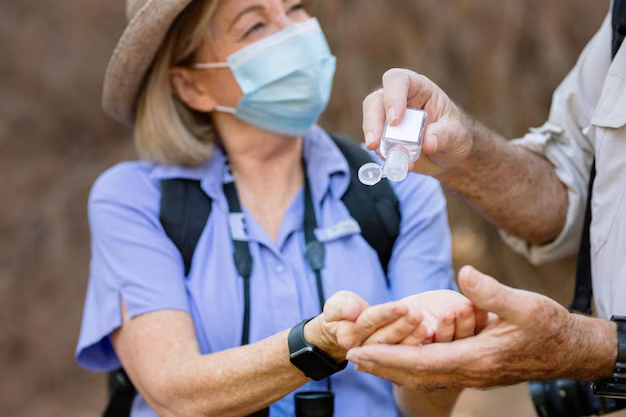Your Guide to How To Manage Medications While Traveling
What You Get:
Free Guide
Free, helpful information about Travel For Seniors and related How To Manage Medications While Traveling topics.
Helpful Information
Get clear and easy-to-understand details about How To Manage Medications While Traveling topics and resources.
Personalized Offers
Answer a few optional questions to receive offers or information related to Travel For Seniors. The survey is optional and not required to access your free guide.
Simplifying Medication Management for Seniors During Travel
Traveling is an enriching experience that brings joy, exploration, and a broadened perspective. For seniors, it can be a chance to reconnect with loved ones, revisit favorite spots, or discover new horizons. However, managing medications while on the move can seem daunting. Fear not; with a bit of preparation, you can ensure a safe, smooth journey without missing a dose. Here’s a comprehensive guide on how to manage your medications while enjoying your travels.
Before You Go: Preparation Is Key
Consult Your Healthcare Provider
Before embarking on any trip, schedule a consultation with your healthcare provider. This is especially vital for seniors who take multiple medications.
- Discuss Travel Plans: Inform your doctor about your destination, travel duration, and climate. This can help anticipate any adjustments needed in your medication regimen.
- Obtain a Medication List: Request a comprehensive list of your medications, including their generic names, dosages, and purposes.
- Consider Medication Adjustment: If crossing time zones, you may need a new schedule to keep your dosing consistent.
Organize Your Medications
- Use a Pill Organizer: A weekly or monthly pill organizer can help keep track of your medicines. Choose one with adequate compartments and easy-to-read labels.
- Label Everything: Ensure each medication bottle is clearly labeled with your name, drug name, and dosage instructions.
- Carry Your Prescriptions: Pack printed copies of your prescriptions as a backup if you lose your medications or need a refill while abroad.
Pack Strategically
- Keep Medications in Original Containers: This is crucial for identification and legality when passing through customs.
- Pack in Carry-On: Always keep your medications in your carry-on bag to avoid loss or damage.
- Bring Extras: Pack an additional week’s supply of medication to account for travel delays or extensions.
In Transit: Stay on Top of Your Routine
Managing Time Zone Changes
Traveling through different time zones can disrupt your medication schedule. Here's how to adjust:
- Gradually Adjust Your Schedule: In the days leading up to your trip, begin adjusting your medication times to match your destination's time zone.
- Use Technology: Set reminders on your smartphone or watch to help you remember to take your medication.
Security and Customs
Airfields and international travel pose specific challenges but are manageable with forethought:
- Declare Medications at Security: When passing through airport security, declare your medications. Pack them separately in a clear, zip-lock bag for a swift inspection.
- Prescription Notes: Present a doctor’s note if your medications require needles or other related medical equipment.
At Your Destination: Maintain Consistency and Safety
Establish a Routine
Keeping to a routine provides comfort and reliability:
- Set Reminders: Use alarms or apps to remind you of medication times, mimicking your routine at home.
- Choose a Convenient Spot: Keep your medications in a consistent location, like next to your bed or with your toiletries, to help you remember to take them.
Be Aware of Environmental Changes
Environmental factors affect medication storage and usage:
- Store Medications Properly: Ensure they're kept at the correct temperature; consider hotel amenities like a fridge for heat-sensitive drugs.
- Hydration and Diet: Traveling often means changes in diet and hydration, both of which can impact medication efficacy.
What to Do If You Miss a Dose
Mistakes happen, even with the best-laid plans:
- Consult Instructions: Most medication instructions include guidance on what to do if a dose is missed.
- Contact a Professional: If in doubt, contact a healthcare provider or a local pharmacist.
Dealing with Medical Emergencies Abroad
In the unlikely event of an emergency:
- Know Local Emergency Numbers: Research these ahead of time.
- Locate Nearby Pharmacies: Have a list of nearby pharmacies at your destination in case you need medications replaced.
- Travel Insurance: Ensure you have travel insurance that covers medical emergencies, potentially saving stressful situations.
Handy Travel Medication Tips 🧳💊
Here’s a quick reference to ensure stress-free medication management while traveling:
- 🔍 Consult Your Healthcare Provider: Before traveling, talk to your doctor about any necessary adjustments.
- 📋 List and Label: Keep a detailed, updated list of medications and ensure all are properly labeled.
- ✨ Use Technology: Leverage apps and alarms for consistent reminders.
- ✈️ Keep Them On-Board: Always carry medications in your hand luggage.
- 🥶 Mind Temperatures: Store medications within recommended temperature ranges.
- 📞 Emergency Contacts: Have local emergency numbers and pharmacy details handy.
When done correctly, medication management should seamlessly integrate into your travel plans, allowing for an enjoyable and fulfilling experience. Taking a proactive role by planning, organizing, and adapting to travel conditions will enhance both the peace of mind and excitement for seniors on the move. Safe travels, and remember, your health is a top priority wherever your journey takes you!

Discover More
- How To Find Senior Discounts On Travel
- How To Find Senior-Friendly Hotels
- How To Find Volunteer Travel Opportunities For Seniors
- How To Get Travel Assistance As a Senior
- How To Plan a Multi-Generational Vacation
- How To Plan a Relaxing Beach Vacation For Seniors
- How To Plan a Senior-Friendly Vacation
- How To Prepare For International Travel As a Senior
